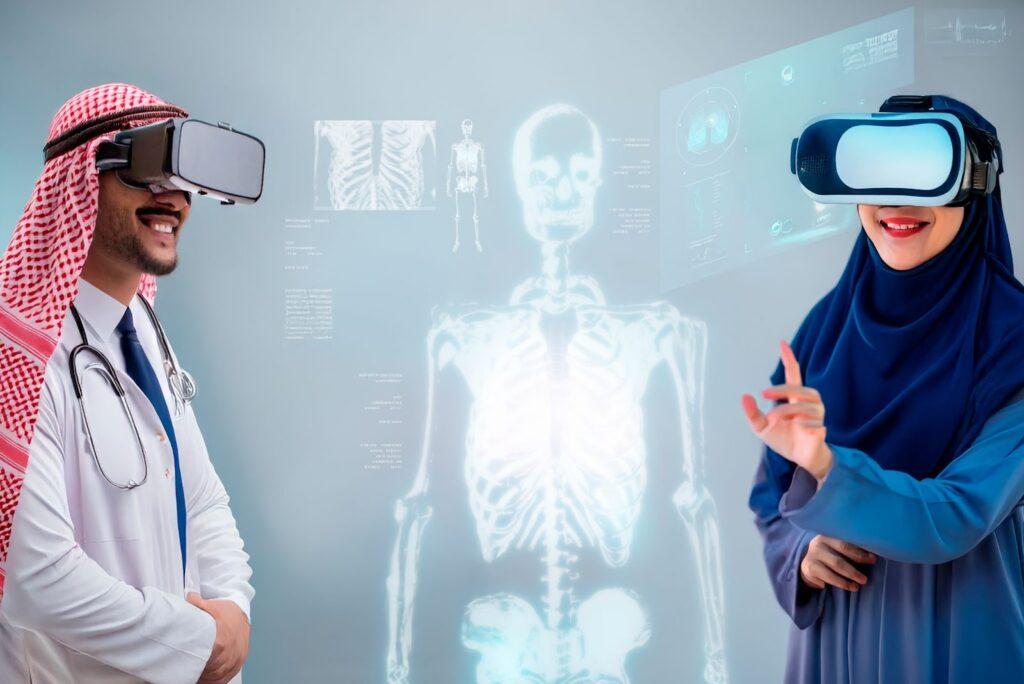Artificial Intelligence and Vision 2030: A New Era for Saudi Arabia’s Digital Economy
Introduction
Saudi Arabia’s Vision 2030 is an ambitious blueprint to transform the Kingdom’s economy, reduce oil dependency, and position Saudi Arabia as a leader in technological innovation and development. A central element of this transformation is the integration of Artificial Intelligence (AI) into various sectors of society, business, and governance. AI is not only reshaping industries across the globe but is also driving Saudi Arabia towards achieving its Vision 2030 goals.
Artificial Intelligence refers to the simulation of human intelligence in machines that are programmed to think, learn, and make decisions. The growing importance of AI in today’s global economy cannot be overstated, as it is seen as the key driver for economic growth, job creation, and the next generation of technological innovation. For Saudi Arabia, embracing AI presents an opportunity to diversify its economy, build new industries, and position itself as a regional leader in the digital age.
This article explores how AI is becoming a cornerstone of Saudi Arabia’s Vision 2030 and how it is contributing to the transformation of the Kingdom into a knowledge-based economy, while also fostering growth in sectors such as healthcare, energy, transportation, education, and government.
Overview of Saudi Vision 2030
Saudi Vision 2030 is a strategic plan set forth by the Saudi government with the primary goal of reducing the Kingdom’s reliance on oil revenues and creating a sustainable, diversified economy. The Vision outlines a roadmap for the next decade, focusing on economic diversification, public sector modernization, and technological innovation.
Key pillars of Vision 2030 include:
- Economic Diversification: Moving beyond oil dependency and establishing non-oil revenue sources such as technology, tourism, entertainment, and finance.
- Public Sector Development: Enhancing efficiency and transparency in government operations through the use of advanced technologies, including AI.
- Building a Knowledge-Based Economy: Fostering innovation and entrepreneurship, with AI being one of the driving forces behind this transformation.
- Global Partnerships: Establishing Saudi Arabia as a hub for international business, research, and innovation.
AI is recognized as a critical tool for achieving many of these goals, particularly in driving economic diversification, improving public services, and positioning the Kingdom as a leader in the digital economy.
Artificial Intelligence and Saudi Vision 2030: A Global Technological Shift
Artificial Intelligence has evolved significantly over the past decade, becoming one of the most transformative technologies in human history. AI includes machine learning, deep learning, natural language processing, robotics, and data analytics. These technologies are revolutionizing industries across the globe, including healthcare, finance, transportation, manufacturing, and retail.
Globally, AI is already being used to optimize business operations, improve customer experiences, and generate new revenue streams. For instance, AI-powered systems are being employed in hospitals for predictive analytics and diagnostic tools, in finance for algorithmic trading and fraud detection, and in retail for personalized shopping experiences.
The global economy has embraced AI due to its potential to increase productivity, drive innovation, and create entirely new markets. For Saudi Arabia, embracing AI is not just about following global trends—it’s about leveraging this technology to transform its traditional industries and create new opportunities that align with Vision 2030’s objectives.
AI and Economic Diversification in Saudi Arabia
A key pillar of Saudi Vision 2030 is economic diversification. Traditionally, Saudi Arabia has been heavily reliant on oil as the main driver of its economy. However, with fluctuating oil prices and the global push for renewable energy, the Kingdom is looking for new, sustainable economic drivers. This is where Artificial Intelligence comes into play.
AI has the potential to completely transform industries, making them more efficient, innovative, and adaptable. In line with Vision 2030’s objectives, AI will create new business models, optimize existing ones, and enable the Kingdom to tap into non-oil industries such as technology, tourism, entertainment, and finance.
AI in Key Sectors:
- Energy: AI is being used in the energy sector to optimize oil production, improve energy efficiency, and explore new energy sources such as solar power and hydrogen. AI technologies help in predictive maintenance for oil rigs, reducing downtime and increasing operational efficiency.
- Healthcare: The Kingdom is investing in AI-driven healthcare technologies, which include predictive diagnostics, personalized medicine, and robotic surgeries. AI in healthcare is helping the Kingdom address healthcare challenges and improve access to high-quality medical services.
- Transportation: AI is playing a major role in transforming Saudi Arabia’s transportation infrastructure. The development of autonomous vehicles and smart transportation systems is expected to significantly reduce traffic congestion and improve public transportation efficiency.
- Finance: The financial sector in Saudi Arabia is transforming with AI integration. AI is being used for fraud detection, algorithmic trading, and improving customer service through AI-powered chatbots.
AI’s integration across these sectors will not only contribute to diversification but will also foster the development of entirely new industries, offering significant job opportunities in the process.
AI and Saudi Arabia’s Vision 2030 Strategic Pillars
AI supports the five strategic pillars of Saudi Arabia’s Vision 2030. These pillars are essential in reshaping the country’s economy, society, and technological landscape.
1. Government Efficiency and AI in Public Services
One of the key aspects of Vision 2030 is improving government efficiency. The Saudi Data and Artificial Intelligence Authority (SDAIA), established in 2019, is tasked with harnessing AI and big data to improve public sector operations. AI can streamline government processes by reducing bureaucracy, improving service delivery, and offering personalized services to citizens.
SDAIA’s initiatives, such as the National Artificial Intelligence Strategy and NEOM, showcase the Kingdom’s commitment to embedding AI into every aspect of governance. By leveraging AI for smart cities, e-government services, and digital platforms, the Kingdom is making strides in improving governance and creating a more transparent and accountable public sector.
2. AI in Healthcare

AI is transforming healthcare in Saudi Arabia, enabling smarter diagnostics, predictive analytics, and personalized treatments. The King Abdulaziz Medical City is implementing AI tools to improve patient care by predicting hospital admissions and optimizing resource allocation. Moreover, AI-powered telemedicine services are expanding access to healthcare, particularly in remote areas.
By integrating AI into healthcare, Saudi Arabia aims to enhance its public health systems, reduce healthcare costs, and improve patient outcomes, in line with its Vision 2030 goal of building a healthy, productive society.
3. AI’s Role in Education Transformation

Education is another area where AI is making a significant impact. Saudi Arabia aims to enhance its educational system by incorporating AI-driven learning platforms, smart classrooms, and personalized education solutions. AI can analyze student data, adapt to individual learning styles, and provide personalized learning experiences, helping students achieve their potential.
AI in education will play a pivotal role in preparing the future workforce of Saudi Arabia. It will ensure that the country is ready to compete in the global knowledge economy by building a highly skilled, adaptable, and future-ready workforce.
4. AI in Smart Cities and Urban Development

As part of Saudi Vision 2030, the country is committed to building smart cities, the most ambitious being NEOM, a futuristic city that will rely heavily on AI to optimize energy use, reduce traffic congestion, and improve public safety. NEOM will integrate AI technologies such as machine learning, IoT, and smart infrastructure to create a seamless and sustainable living environment for its residents.
Smart cities are expected to create job opportunities in AI development, urban planning, and related sectors. These cities will be models for sustainable development, showcasing how AI can contribute to solving pressing urban challenges.
5. AI and National Security
National security is a top priority for Saudi Arabia. AI is being integrated into cybersecurity systems, surveillance, and intelligence gathering. The Saudi government is investing in AI-powered systems that can analyze vast amounts of data, identify security threats in real time, and prevent cyberattacks, ensuring that the Kingdom remains secure in the face of emerging digital threats.
AI and Innovation in Saudi Arabia
Saudi Arabia is fast emerging as a hub for technological innovation, particularly in AI. The government has recognized the importance of AI in driving future economic growth and has made substantial investments in this sector. This has positioned Saudi Arabia to become a global leader in AI research, development, and innovation.
AI Research and Development in Saudi Arabia
Saudi universities, research centers, and private sector firms are all investing heavily in AI research. The King Abdulaziz City for Science and Technology (KACST) is one of the Kingdom’s leading institutions in AI research. Through collaboration with global AI firms and universities, Saudi Arabia is aiming to develop local AI talent, foster innovation, and create new AI-driven technologies.
Key Initiatives Supporting AI in Saudi Arabia
Several key initiatives are already underway to integrate AI into the Kingdom’s infrastructure. Among these, the Saudi Data and Artificial Intelligence Authority (SDAIA), created in 2019, is tasked with overseeing AI implementation and coordinating efforts to build a comprehensive AI ecosystem.
NEOM: A Future AI City
NEOM, a $500 billion megacity project in northwestern Saudi Arabia, is perhaps the most ambitious initiative under Vision 2030. It is designed to be a fully integrated AI-powered city, where technologies like autonomous vehicles, AI-enhanced healthcare, and smart energy systems will be at the forefront. The goal is for NEOM to serve as a model for future smart cities globally, with AI being at the core of its operation.
Challenges and Opportunities
Despite the clear opportunities, there are challenges that Saudi Arabia must overcome to fully leverage AI. These include the skills gap, where there is a need for more AI talent, both within the country and globally. Additionally, there are concerns over data privacy and cybersecurity, which must be addressed as AI technologies are increasingly integrated into critical infrastructure.
However, the Kingdom’s proactive approach to these challenges—through investment in education, international collaboration, and the development of robust regulatory frameworks—presents a clear path forward for realizing the full potential of AI in Vision 2030.
Conclusion: AI as a Driver of Saudi Arabia’s Digital Economy
Artificial Intelligence is set to play a pivotal role in Saudi Arabia’s Vision 2030, transforming the Kingdom into a global leader in the digital economy. By integrating AI into key sectors such as healthcare, energy, transportation, and government services, Saudi Arabia is well-positioned to achieve its Vision 2030 goals of economic diversification, social development, and technological innovation.
The Kingdom’s commitment to AI research and development, coupled with its investment in smart cities and AI-powered infrastructure, is creating a new era of opportunities. As Saudi Arabia continues to foster innovation, invest in talent, and address challenges, AI will undoubtedly be the driving force behind its digital transformation.
For further reading and updates, you can explore resources like The Saudi Data and Artificial Intelligence Authority (SDAIA) or visit Vision 2030 Official Website.


